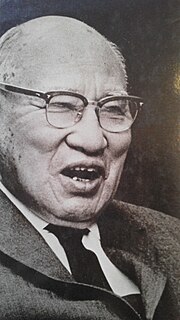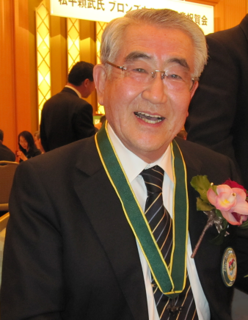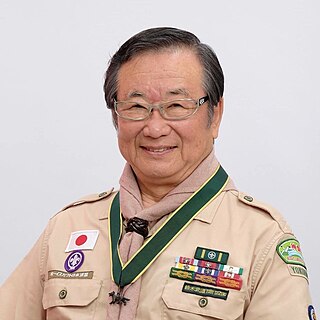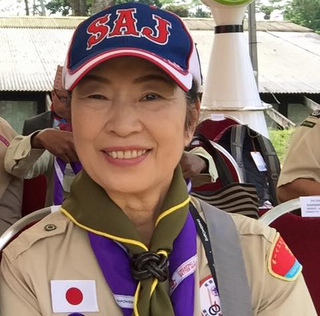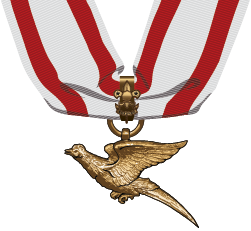Teiji Takemiya(竹宮 帝次Takemiya Teiji) (Los Angeles 1923-) was a nisei Japanese American [1] served as the Deputy International Commissioner of the Scout Association of Japan, a member of the National Board of Trustees, and a member of the Asia-Pacific Scout Committee.

Los Angeles, officially the City of Los Angeles and often known by its initials L.A., is the most populous city in California and the second most populous city in the United States, after New York. With an estimated population of four million, Los Angeles is the cultural, financial, and commercial center of Southern California. Nicknamed the "City of Angels" partly because of its name's Spanish meaning, Los Angeles is known for its Mediterranean climate, ethnic diversity, Hollywood, and the entertainment industry, and sprawling metropolis.

Japanese Americans are Americans who are fully or partially of Japanese descent, especially those who identify with that ancestry, along with their cultural characteristics. Japanese Americans were among the three largest Asian American ethnic communities during the 20th century; but, according to the 2000 census, they have declined in number to constitute the sixth largest Asian American group at around 1.4 million, including those of partial ancestry. According to the 2010 census, the largest Japanese American communities were found in California with 272,528, Hawaii with 185,502, New York with 37,780, Washington with 35,008, Illinois with 17,542, and Ohio with 16,995. Southern California has the largest Japanese American population in North America and the city of Torrance holds the densest Japanese American population in the 48 contiguous states.

The Scout Association of Japan is the major Scouting organization of Japan. Starting with boys only, the organization was known as Boy Scouts of Japan from 1922 to 1971, and as Boy Scouts of Nippon from 1971 to 1995, when it became coeducational in all sections, leading to neutral naming. Scouting activity endured a heavy setback during World War II, but slowly recovered and membership at the end of May 2017 was 99,779.
He attended the signing ceremony of the official Japanese surrender of World War II on board the USS Missouri (BB-63) in 1945. [2]

The Japanese Instrument of Surrender was the written agreement that formalized the surrender of the Empire of Japan, marking the end of World War II. It was signed by representatives from the Empire of Japan, the United States of America, the Republic of China, the United Kingdom of Great Britain and Northern Ireland, the Union of Soviet Socialist Republics, the Commonwealth of Australia, the Dominion of Canada, the Provisional Government of the French Republic, the Kingdom of the Netherlands, and the Dominion of New Zealand. The signing took place on the deck of USS Missouri in Tokyo Bay on September 2, 1945.

World War II, also known as the Second World War, was a global war that lasted from 1939 to 1945. The vast majority of the world's countries—including all the great powers—eventually formed two opposing military alliances: the Allies and the Axis. A state of total war emerged, directly involving more than 100 million people from over 30 countries. The major participants threw their entire economic, industrial, and scientific capabilities behind the war effort, blurring the distinction between civilian and military resources. World War II was the deadliest conflict in human history, marked by 50 to 85 million fatalities, most of whom were civilians in the Soviet Union and China. It included massacres, the genocide of the Holocaust, strategic bombing, premeditated death from starvation and disease, and the only use of nuclear weapons in war.

USS Missouri (BB-63) is an Iowa-class battleship and was the third ship of the United States Navy to be named after the U.S. state of Missouri. Missouri was the last battleship commissioned by the United States and is best remembered as the site of the surrender of the Empire of Japan which ended World War II.
In 1998, Takemiya was awarded the 268th Bronze Wolf , the only distinction of the World Organization of the Scout Movement, awarded by the World Scout Committee for exceptional services to world Scouting.

The World Organization of the Scout Movement is the largest international Scouting organization. WOSM has 170 members. These members are recognized national Scout organizations, which collectively have over 50 million participants. WOSM was established in 1922, and has its operational headquarters at Kuala Lumpur, Malaysia and its legal seat in Geneva, Switzerland. It is the counterpart of the World Association of Girl Guides and Girl Scouts (WAGGGS).


